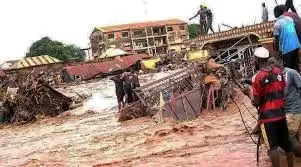MOKWA, NIGER STATE – A catastrophic flood that swept through Mokwa Local Government Area on May 29, 2025, has left a trail of devastation, with the Niger State Government reporting over 700 people still unaccounted for. The disaster, described as one of the worst in the state’s history, claimed 207 lives and displaced more than 3,000 households, plunging communities into grief and uncertainty.
Governor Mohammed Umaru Bago, speaking through his Deputy, Yakubu Garba, during a press briefing in Minna, labeled the flood a “national disaster” of unprecedented scale. “The magnitude of this tragedy is beyond what our state has ever witnessed,” Garba said, his voice heavy with emotion. “We are not only mourning the confirmed losses but also racing against time to locate the missing and support the displaced.”
The floods, triggered by days of relentless rainfall and the overflow of the Niger River, ravaged farmlands, homes, and infrastructure across Mokwa. Entire villages were submerged, with mud-brick houses collapsing under the force of the raging waters. Local farmer Aisha Suleiman, 42, recounted her harrowing experience: “The water came at night, so fast we couldn’t save anything. My husband and two children are still missing. We’ve been searching for weeks.”
Preliminary investigations reveal that over 50% of the victims were non-indigenes, including migrant workers and traders from neighboring states who had settled in Mokwa’s bustling agricultural communities. The state government has launched a comprehensive probe to ascertain the exact cause of the disaster, with early reports pointing to poor drainage systems, deforestation, and unregulated construction along riverbanks as contributing factors.
Relief efforts are in full swing, with the state government collaborating with federal agencies, NGOs, and local institutions to provide aid. Governor Bago announced that each affected family would receive a minimum of N1 million to help rebuild their lives, alongside temporary shelters and food supplies. “We are committed to ensuring no one is left behind,” Garba assured. However, some displaced residents, now camped in makeshift shelters, expressed frustration over delays in aid distribution. “We’ve received some food, but it’s not enough. We need help to start over,” said Ibrahim Musa, a displaced trader.
Veritas University, located near Mokwa, has stepped up to support the relief efforts, donating food, clothing, and medical supplies. The institution’s Vice-Chancellor, Prof. Hyacinth Ichoku, revealed that several students lost family members in the floods, casting a somber mood over the campus. “Our students are grieving, and as a community, we are doing all we can to provide relief and counseling,” he said during a donation ceremony.
The National Emergency Management Agency (NEMA) has deployed teams to assist with search and rescue operations, while the Red Cross and other humanitarian organizations are providing medical care to survivors, many of whom sustained injuries or are battling waterborne diseases. The state government has also appealed for federal and international support to address the crisis’s scale.
As the search for the missing continues, stories of loss and resilience are emerging. Fatima Usman, a mother of five, tearfully recounted how her neighbors banded together to save her children from the floodwaters. “We climbed onto the roof and waited for hours until help came. I lost everything, but my children are alive. That’s what keeps me going,” she said.
Governor Bago has vowed to implement long-term measures to prevent future disasters, including stricter regulations on construction near waterways and investments in flood control infrastructure. For now, Mokwa’s residents are left to pick up the pieces, holding onto hope that their missing loved ones will be found and that the promised aid will help them rebuild.
The Niger State Government has set up a dedicated helpline and relief centers for families seeking information about missing persons or assistance. As the nation rallies behind Mokwa, the tragedy underscores the urgent need for climate resilience and disaster preparedness in vulnerable regions.
Tags
News

